How Do You Get to Havana on Black Flag
- "Havana was a low port surrounded by green forest and tall palm trees, their fronds a lush green that wafted gently in the breeze, waving us in as our schooner sailed into port. In the busy town, white-stone buildings with red-slate roofs looked dilapidated and weather-beaten, bleached by the sun and blasted by the wind."
- ―Edward Kenway describing Havana, 1715.[src]
Havana (Spanish: La Habana) is the capital and commercial center of the island country of Cuba in the Caribbean.
Founded by Spaniards in the 16th century, Havana served as a springboard for the Spanish conquest of the Americas and became a stopping point for the treasure-laden Spanish galleons on the crossing between the New World and the Old World. As a result, the city flourished both economically and culturally.
Contents
- 1 History
- 1.1 Humble beginnings
- 1.2 Key to the New World
- 1.3 Later developments
- 1.4 Modern times
- 2 Trivia
- 3 Gallery
- 4 Appearances
- 5 References
History
Humble beginnings
In the early 1500s, several attempts were made to found a town near the Havana Bay[1], around 1514,[2] with a settlement eventually being established on the southern coast by the Spanish conquistador Diego Velázquez de Cuéllar.[1] [2] However, the city was moved north in 1519 for strategic reasons, namely the narrow passageway of the bay which provided easy shelter for ships, with three different harbors constructed due to the island's large size.[3]
Sitting on a bay that opened to the Gulf Stream, Havana became a natural stopping point between Europe and the Americas. As the city grew around its trade port, Havana became a target for buccaneer and privateer attacks. In 1555, Havana was partially burnt to the ground by the French corsair Jacques de Sores, forcing the Spanish Crown to build fortifications.[1] [3] [2]
Key to the New World
- "Well they don't take kindly to pirates here, do they? Wonder how many stolen reales bought these men this perch?"
- ―Edward Kenway on Havana, 1715.[src]
Following a royal decree in 1561, all ships of the annual treasure fleet were required to meet up in Havana before they crossed the Atlantic Ocean. This boosted commerce and development of the city, with Havana supplying food and equipment for most of the Spanish fleet. It eventually became the richest and largest port in the Caribbean,[3] making it a prime target for pirates, who hoped to rob the treasure fleet's ships of their riches.[1] The pirates were able to infiltrate Havana, contributing to the rise of corruption.[4]
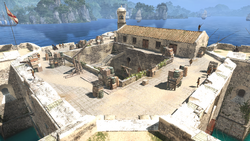
Castillo de San Salvador de la Punta
To ward off potential attackers, military forts such as the Castillo de San Salvador de la Punta and the Castillo Morro were constructed.[5] Despite this, attacks from pirates and privateers continued.[4] In 1634, Havana was officially designated the "Key to the New World and Rampart of the West Indies" by the Spanish Crown.[3]
In 1708, the Templar Laureano de Torres y Ayala was appointed Governor of Cuba with the help of his allies in the Spanish Court. Establishing his own Order in the West Indies, he orchestrated Templar involvement in the Caribbean from his mansion within the city. Torres would also make many lasting improvements to the city, fortifying the island's defenses and kick-starting the production of tobacco. He remained governor until 1716, following which he retired and dedicated his life to charitable functions, such as financing hospitals.[5] [2]
The Assassin Order also maintained a presence in Havana during this time, running an Assassin bureau headed by Rhona Dinsmore.[5] [2] She faced opposition from Templar agent Hilary Flint, who used local pickpockets to fund an arms race against her, though he was eliminated by the combined efforts of Dinsmore and Edward Kenway in 1717.[5] Following Torres' death in 1722 and the subsequent decline of the Caribbean Templars,[5] [2] she was able to expand her branch of Assassins and secure full control of the city for many years, focusing on keeping it safe from territorial squabbles.[6]
By the mid-18th century, Havana had reached a population of more than 70,000 people, exceeding the size of other New World settlements like New York and Boston.[2] [3] Despite Dinsmore's efforts, the city eventually became embroiled in the Seven Years' War and was captured by the British in 1762. Less than a year later, the Treaty of Paris ensured the return of Havana to Spain, though Spain had to cede Florida to Great Britain in return.[3] The de Grandpré business also sent ships to Havana to import and export goods.[7]
Later developments
During the 19th century, Havana flourished, benefitting greatly from trade with the United States. Having become an economic and cultural center, the city was referred to as the "Paris of the Caribbean".[3]
In 1898, while the Cubans were fighting their war of independence, the battleship USS Maine exploded in the port of Havana. The incident gave the United States a pretext to occupy the wealthy island for four years, starting the Spanish-American War. Later still, Fidel Castro would lead a revolution to install a communist regime that nationalized all foreign assets, including the powerful American United Fruit Company.[3]
Modern times
- "La Havana: Treasure of the West Indies, haven to the poor, seat of the rich, replete with nooks and crannies, and ideal opportunities for a quick escape."
- ―An Abstergo Entertainment employee introducing Havana in Wolfpack's Discovery mode.[src]
In 2013, Havana was used as a simulated location created by Abstergo Industries' entertainment branch, in order to influence the general public through the console stage of their Animus technology.[5]
Trivia
- Havana is the only city in Assassin's Creed IV: Black Flag in which no animals can be hunted.
- Several in-game sources refer to Havana's "Poor District", despite cities in Black Flag not being divided into districts.
- Furthermore, district specification of "Poor", "Middle", and "Rich" is identical to the one seen in Assassin's Creed.
Gallery

Bird's eye view of Havana

Havana skyline

Havana's port
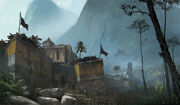
Fortifications in Havana
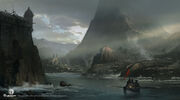
Rowers entering Havana Bay

View of the Havana Bay

View of the Havana Bay


Plaza de la Catedral

A plaza in Havana

Streets of Havana
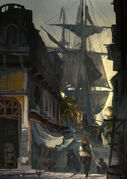
Streets of Havana
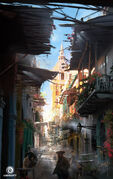
An alleyway in Havana
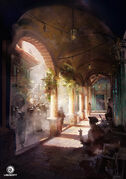
An alcove in Havana

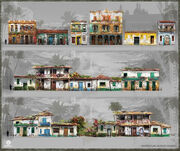
Various types of buildings
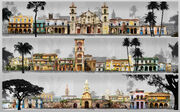
Various landmarks
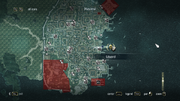
In-game map of Havana
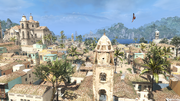
Edward Kenway on a viewpoint in Havana
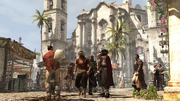
The Cathedral of Havana
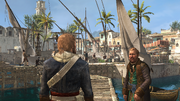
Stede Bonnet and Edward at the port of Havana
Appearances
- Assassin's Creed III: Liberation (mentioned only)
- Assassin's Creed: Initiates (mentioned only)
- Assassin's Creed IV: Black Flag (first appearance)
- Assassin's Creed: Identity (mentioned in Database entry only)
- Assassin's Creed: Rogue (mentioned only)
References
- ↑ 1.0 1.1 1.2 1.3 Assassin's Creed IV: Black Flag – Database: Havana
- ↑ 2.0 2.1 2.2 2.3 2.4 2.5 2.6 Assassin's Creed: Identity – Database: Havana (Identity)
- ↑ 3.0 3.1 3.2 3.3 3.4 3.5 3.6 3.7 Assassin's Creed Encyclopedia
- ↑ 4.0 4.1 Assassin's Creed: Initiates – The Golden Age of Piracy: "The Fortified City"
- ↑ 5.0 5.1 5.2 5.3 5.4 5.5 Assassin's Creed IV: Black Flag
- ↑ Assassin's Creed: Rogue
- ↑ Assassin's Creed III: Liberation
| Assassin's Creed IV: Black Flag | |||||||||||||||
|---|---|---|---|---|---|---|---|---|---|---|---|---|---|---|---|
| Characters |
| ||||||||||||||
| Vessels | Benjamin • El Arca del Maestro • El Impoluto • Hercules (brig) • Hercules (frigate) • HMS Courage • HMS Defiance • HMS Fearless • HMS Intrigue • HMS Prince • Hollander • Jackdaw • Jacobite • La Dama Negra • Ranger • Revenge • Royal Fortune • Royal Phoenix • Royal Sovereign • San Ignacio • San Lorenzo • Princess • Queen Anne's Revenge | ||||||||||||||
| Factions | Assassins (West Indies Brotherhood) • Templars (Abstergo Industries • Abstergo Entertainment | West Indies Rite) • Instruments of the First Will | British Empire (British Army • British Navy) • Pirate hunters • Portuguese Empire (Portuguese Navy) • Republic of Pirates • Spanish Empire (Spanish Army • Spanish Navy) | ||||||||||||||
| Locations | Montreal | Africa (Príncipe) • The Bahamas (Abaco Island • Andreas Island • Cat Island • Crooked Island • Great Inagua • Mariguana Island • Nassau) • Black Island • Caribbean Sea • Corozal • Cayman Islands (Cayman Sound • Grand Cayman) • Cayo Island • Cuba (Arroyos • Cape Bonavista • Cumberland Bay • Havana • Matanzas • Pinos Isle) • Florida • Forts (Cabo de Cruz • Castillo de Jagua • Charlotte • Chinchorro • Conttoyor • Dry Tortuga • Eleuthera • Gibara • Navassa • Punta Guarico • Serranilla) • Haiti (Île à Vache • Tortuga) • Isla Providencia • Jamaica (Long Bay • Kingston • Observatory • Port Royal) • Misteriosa • Mystery Island • New Bone • North Carolina (Charles-Towne) • Ocracoke • Sacrifice Island • Salt Key Bank • Salt Lagoon • Santanillas • Shipwreck sites (Antocha wreck • The Black Trench • The Blue Hole • Devil's Eye Caverns • Kabah Ruins • La Concepcion wreck • San Ignacio wreck) • Smuggler dens (Ambergris Key • Anotto Bay • Jiguey • Petite Caverne • San Juan) • Tulum | ||||||||||||||
| Events | War of the Spanish Succession • Golden Age of Piracy (Sinking of the Treasure Fleet • Attacks on Tulum • Siege of Charles-Towne • Blockade of Nassau • Attack on Ocracoke) | ||||||||||||||
| Terms and concepts | Abstergo Data • Achievements • Animus data fragments • Blood vials • Challenges • Crafting • Customization • Dual-wielding • Eagle Vision • Eavesdropping • Leap of Faith • Memories • Multiplayer • Outfits • Pieces of Eden (Crystal Skulls) • Ships (Gunboat • Schooner • Brig • Frigate • Man O' War) • Swimming • Treasure chests • Viewpoints | ||||||||||||||
| Weapons and tools | Bayonets • Blowpipe • Cannons • Firearms • Hidden Blade • Rope darts • Swords | ||||||||||||||
| DLC | Aveline • Blackbeard's Wrath • Crusader & Florentine Pack • Death Vessel Pack • Freedom Cry • Guild of Rogues • Illustrious Pirates Pack • Kraken Ship Pack | ||||||||||||||
How Do You Get to Havana on Black Flag
Source: https://assassinscreed.fandom.com/wiki/Havana